EQUINE WELFARE NETWORK PROFILE
Saving Horses, Inc
http://www.savinghorsesinc.com

Saving Horses, Inc
3224 Wildflower Valley Drive
Encinitas, CA 92024
Founded: 2007
3224 Wildflower Valley Drive
Encinitas, CA 92024
Mailing Address:
3224 Wildflower Valley Drive
Encinitas, CA 92024
Phone: 619-247-7237
MAKE AN INQUIRY
View our WEBSITE
EIN: 26-0519018Founded: 2007
View our PHOTO GALLERY
Profile Last Updated January 9, 2026Public Charity

2025
The Guardian Seal of Transparency is awarded annually to recognize an organization's commitment to transparency and accountability by their willingness to make comprehensive data about their programs, horse care practices, and governance available for public scrutiny. The Guardian Seal of Transparency is NOT an endorsement.
Awarded Annually
Last Updated: August 19, 2025
Last Updated: August 19, 2025
Saving Horses, Inc has not attained the Guardian designation for 2026.
Dewdrop's Heart
Our Equine Ambassador

Dewdrop's Heart AKA "Dewey", has a heart shaped star on her forehead. Dewey was raced from ages 2-4yrs, then dumped on a feedlot at the end of her racing career. Saving Horses, Inc., rescued her from the Bowie, TX feedlot, and transported her to our facility in CA. Dewey was emotionally traumatised by her life on the track. Additionally she had sustained physical injuries. 4 years later she still lacks trust of humans, yet she tries so hard, and has come a long way. In spite of this she has a good work ethic and enjoys her hand walks by volunteers and rides by our trainer. Dewey is an example of courage, patience and perseverance. She has beaten the odds. She is a reminder to all to never give up, and has helped in the counseling of those with addiction. It is because of horses like Dewey that we do what we do.
MISSION & PROGRAMS
Mission:Saving Horses, Inc. rescues horses from slaughter, abuse and neglect. SHI rehabilitates these horses, and they get to live out their days at our sanctuary. SHI gives horses a second chance and a better life. We promote the human/horse relationship by way of volunteer opportunities to a wide variety of individuals from our local community, all ages, all socio economic backgrounds and even some with special needs.Creating an environment that embodies spirituality, healing and love in a way few places do.
Our organization provides programs involved with equine rescue & retirement
Our organization provides outreach and/or public education programs involving horses.
100% of our total programs and services are equine-related.
Our organization is directly responsible for the care and shelter of equines involved in our programs.
Our organization CURRENTLY uses satellite, overflow, foster, and/or outreach facilities which adhere to all the policies, procedures and practices of our organization or did in the previous year. Facility information is provided for the organization's main, satellite and overflow facilities.
Please describe what steps your organization takes to ensure that:
1) all interactions between your equines and people are mutually beneficial and conducted in accordance with the Guidelines for Human-Equine Interactions stated below;
2) all equines in the care of our organization and/or equines that participate in the organization's program have access to clean drinking water at all times; nutritious food in sufficient quantity, including natural forage such as pasture grass and/or hay; appropriate veterinary, farrier, and dental care; shelter and protection from the weather; sufficient safe space to move around comfortably on a daily basis; and daily opportunity to freely interact and have contact with other equines:
SHI has seasoned volunteers who have been helping for years. Upon entry to our volunteer program ad new comer will be paired with a seasoned volunteer. The feeding, day to care care is learned hands on with optimum guidance. President Audrey Reynolds is also present and actively involved in the training of new volunteers. The horses at SHI eat 4 times daily, and the specifics of the feeding program are taught to everyone, and any changes are updated in the feed room for all to see.
The handling and interaction of horses with humans is closely observed by President.The humans know almost immediately which horse(s) they are drawn to and form a connection with. We encourage hand walking and grooming. None of our horses are involved in any high energy/impact activities. It is a Zen and quiet experience at our ranch. The formal therapy sessions are conducted similarly. No horse will ever experience stress. If they do not wish to interact on any given day they will not be forced to.
Our veterinarian visits once monthly and is on call for any other instances for which she may be needed. We have emergency vet supplies on hand and experienced personnel available at all times.
Horses have their teeth floated once a year and farrier care every 6 weeks.
All horses have shelter, adequate forage, water. They have access to each other across the fence, and for those horses that get along will be turned out together,
Equine Transition Services:
Overview of our programs involved with rescue, rehabilitation, retraining, re-homing and/or retirement:
Our horses were rescued from slaughter bound feedlots, and situations of abuse and neglect. The horses were rehabilitated and retrained where necessary. We have re homed horses in the past, but we are currently not offering horses for adoption. Rather than adoptions we are concentrating more on our volunteering and education program for a wide gamut of individuals from our local community. Individual of all ages, from various socio-economic backgrounds and some with special needs, Veterans, First responders and at risk teens, encompasses our volunteer community. Working with and being around the horses provides a bonding, loving and healing environment for these individuals, while the younger ones enjoy learning all there is to know about these magnificent animals.
Outreach and/or Public Education:
SHI welcomes Girl Scouts, Boy Scouts, school groups, and any new volunteers whom we educate about the importance of responsible animal ownership, and raise awareness about certain equine industries who abuse and throw away horses, backyard breeders.
SHI also welcomes the opportunity to speak at any special event.
SHI usually has a fundraising event once a year at a local horse show which gives us an opportunity to educate horse owners,and encourage people to consider volunteering.
SHI has been offering EAS services for many years. unfortunately our PHD Psychotherapist, Tufia Steidle has accepted a position in Los Angeles and will be away for at least one year. We are in search of a replacement Equine assisted specialist but as yet we have not found anyone suitable. We will expand our volunteer/education program.
Research/Medical Use of Equines:
Our organization has never made, and would not ever consider making, equines available for research studies or medical training that involves invasive procedures and/or that which may cause pain or suffering to the equine.
Religious Affiliation:
Our organization does not promote religious education, religious purposes, or a specific religious faith or use donations for religious education or religious purposes; require participants to be of a certain faith; require participation in religious, instruction, activities or services; or require participation in prayer, worship, religious instruction or other religious activities as a condition of receiving social or secular services offered.
Auction Donation:
Our organization has never allowed, or would not consider allowing, an equine to be sold, transferred, released, or otherwise placed into possession of any person or organization that would cause or allow the equine to be sold at auction for slaughter.
POLICIES: INTAKE, ASSESSMENT & TRAINING
Prior to a horse being accepted and/or arriving at the facility, the organization has the following policies in place:The owner of a potential equine is interviewed over the phone or in person prior to seeing the equine
The equine is evaluated at its place of residence
The owner completes an application/contract which constitutes the agreement between the owner and our organization when the equine is acquired from the equine's owner other than by seizure or by abandonment
If health records are not available or are out-of-date, our veterinarian will administer appropriate vaccinations
A health certificate signed by a veterinarian and dated no more than seven days prior to arrival is provided to our organization either prior to or upon arrival of the equine attesting to the health status of the equine
Not Checked:
The owner is financially responsible for the shipping of the equine to and from the organization
The owner is financially responsible for the shipping of the equine to and from the organization
Trial Period: Check all that apply:
Equines are not taken on trial
Upon intake, the organization has the following quarantine policy in place:
The equine is confined to a designated and separate area for isolation and quarantine at the facility for a prescribed period of time
The equine is confined to a designated and separate area for isolation and quarantine off-site for a prescribed period of time
Not Checked:
The equine is not quarantined
The equine is not quarantined
The typical length of quarantine is: 20 to 30 days
Following arrival of the equine at the facility, the following is performed:
Physical examination to include temperature, pulse and respiration by a trained staff member upon arrival
A Henneke Body Conditioning Score or other body conditioning score is assigned by a trained staff member upon arrival
Photographs are taken of each equine upon arrival at the facility and kept with the equine's health records
Physical examination by a farrier
Physical examination by a dentist
Not Checked:
Physical examination to include temperature, pulse and respiration by a veterinarian upon arrival
A Henneke Body Conditioning Score or other body conditioning score is assigned by a veterinarian upon arrival
The equine is microchipped if the equine has not been microchipped
Physical examination to include temperature, pulse and respiration by a veterinarian upon arrival
A Henneke Body Conditioning Score or other body conditioning score is assigned by a veterinarian upon arrival
The equine is microchipped if the equine has not been microchipped
Horses are assessed for following skills and behaviors:
Retrieval from a pasture/paddock
Leading with a halter and lead rope
Temperament, disposition and attitude, such as rated from very calm to very high spirited
Saddling
Bridling
Lunging
Loading onto and unloading off a trailer
Mounting and dismounting
Riding at the walk
Riding at the trot
Riding at the canter
Riding by a beginner and/or unbalanced rider
Tolerance to unusual objects and loud noises
Known vices, i.e., cribbing, biting, kicking, weaving, stall walking, etc
Grooming
Bathing
Clipping
Tolerance to multiple handlers at the same time
Not Checked:
Jumping
Driving (Pulling a carriage)
Jumping
Driving (Pulling a carriage)
Our organization has the following policies and procedures in place pertaining to the ongoing assessment of horses in its care:
Physical examination by a veterinarian at least annually
The Henneke Body Condition score or other body conditioning score is updated at least annually by the veterinarian
Vaccinations are administered at least annually
Photographs are taken of each equine annually and kept with the equine's health records
Equines at our facility may be treated by an equine chiropractor
Equines at our facility may be treated by an equine acupuncturist
Equines at our facility may be treated by an equine massage therapist
Equines at our facility may be treated by an equine nutritionist
Not Checked:
The Henneke Body Condition score or other body conditioning score is updated at least annually by a trained staff member
Photographs are taken of each equine monthly and kept with the equine's health records
The Henneke Body Condition score or other body conditioning score is updated at least annually by a trained staff member
Photographs are taken of each equine monthly and kept with the equine's health records
Our organization has the following policies and procedures in place pertaining to the weight-carrying or workload capabilities of horses/equines that are ridden in our care:
Our organization evaluates the weight-carrying and workload limitations for each equine that is ridden at least annually
Our organization maintains a written record of the weight-carrying and workload limitations for each equine that is ridden
Not Checked:
Our organization does not evaluate the weight-carrying and workload limitations for each equine that is ridden
No equines are ridden; not applicable
Our organization does not evaluate the weight-carrying and workload limitations for each equine that is ridden
No equines are ridden; not applicable
The following variables are considered in determining the weight-carrying and workload limitations for each equine that is ridden:
Equine age, weight, breed, body condition, fitness, balance, health and soundness
Equine conformation to include the top line, length of back, strength and width of loin, bone density (measured by the circumference of the cannon bone just below the knee)
Size, shape, condition and angle of the hooves
Participant weight, height, body proportions, balance, fitness and riding skills as well as behavioral issues and safety concerns
Weight and proper fit of the saddle and other equipment
Terrain and footing in the working environment
Duration and frequency of working sessions, as the frequency with which an equine is subjected to maximum weight carrying and/or workload
Nature and pace of work, repetitive or varied, radius of turns, degree of incline and regularity of footing when equine is subject to maximum weight-carrying capacity
Temperature and/or weather conditions
Seasonal impact on the equines' workload and weight-carrying capabilities and limitations
Not Checked:
Our organization does not evaluate the weight-carrying and workload limitations for each equine that is ridden
No equines are ridden; not applicable
Our organization does not evaluate the weight-carrying and workload limitations for each equine that is ridden
No equines are ridden; not applicable
Horses provided formal training (groundwork or riding): 2-3 times per week
Additional information about our intake, assessment & training policies and practices:
Volunteers do not ride our horses. We currently only have (2) rideable horses. They are ridden 3-4 times weekly by a paid professional. These horses arrived at our sanctuary with lameness issues, which needs to be maintained to keep the horses sound. Since they are still young (at age 10) they have high energy and are in need of "a Job". Hence we feel the need for them to be exercised under saddle which is better for their mental well being. None of the volunteers are experienced enough to ride either of these horses. Dewdrop is an OTTB, abused on the track, she has trust issues. Neither of these horses are considered adoptable. They would be costly to maintain, and not 100% sound. Our "trainer" only charges $10 per ride.
Horses rescued out of state are quarantined out of state. A health certificate is issued prior to transportation of the horse to the SHI facility. Horses rescued locally, if from auction or feedlot will be quarantined at our facility. If coming from a private home or facility, they will not be quarantined unless an illness is indicated. Either way a health certificate will be issued on the horse prior to arrival at SHI facility. If QT is necessary, the horse will be quarantined at SHI facility. Our veterinarian is always consulted.
POLICIES: BREEDING
The organization has the following policies related to breeding and stallions:Our organization does not conduct breeding of equines owned or under the care of our organization.
The main facility where our organization conducts its programs does NOT breed equines.
Not Checked:
One or more of the facilities where our organization conducts its programs, including foster/temporary care facilities, breeds equines
One or more of the facilities where our organization conducts its programs, including foster/temporary care facilities, are permitted to house stallions
One or more of the facilities where our organization conducts its programs, including foster/temporary care facilities, breeds equines
One or more of the facilities where our organization conducts its programs, including foster/temporary care facilities, are permitted to house stallions
POLICIES: EUTHANASIA
The organization has the following policies related to euthanasia:Our organization will never have an equine euthanized for space
Our organization will have an equine euthanized upon the recommendation of the veterinarian if the equine is a threat to itself, other equines, or people
Our organization will have an equine euthanized upon the recommendation of the veterinarian after all reasonable treatment options have been explored
Euthanasia is done on site when possible to decrease trauma from transport
Disposal of the carcass is handled within 24 hours
Not Checked:
Our organization will never have an equine euthanized under any circumstances
Euthanasia is done at the veterinarian's facility
Our organization will never have an equine euthanized under any circumstances
Euthanasia is done at the veterinarian's facility
The following are authorized to administer the procedure for your organization in accordance with state laws:
Veterinarian
Not Checked:
A certified euthanasia technician
Senior staff with appropriate training
Employee of animal control shelter or humane society with appropriate training
Veterinary student under the supervision of a licensed veterinarian
Not applicable. Our organization prohibits euthanasia under any circumstances
A certified euthanasia technician
Senior staff with appropriate training
Employee of animal control shelter or humane society with appropriate training
Veterinary student under the supervision of a licensed veterinarian
Not applicable. Our organization prohibits euthanasia under any circumstances
POLICIES: RE-HOMING
Re-homing Agreement not applicable.Our organization has the following re-homing (adoption/purchase) policies and procedures in place:
The organization does not re-home equines under any circumstances; our organization retains custody of our equines and ensures care of the equines for their lifetimes.
Our organization has the following policies and procedures related to horses that need to be retired, are no longer able to contribute to the mission of the organization, and/or are no longer manageable:
The organization does not re-home equines under any circumstances; our organization retains custody of our equines and ensures care of the equines for their lifetimes.
Equines may remain at our organization for their lifetimes
In the case an equine is unmanageable and demonstrates repeated dangerous behaviors, the equine may be euthanized upon the recommendation of the veterinarian
In the case an equine is unsound and/or unhealthy and cannot be treated to relieve suffering, the equine may be euthanized upon the recommendation of the veterinarian
The organization will accept financial responsibility for equines in the current care of the organization that need to be retired or are no longer able to contribute to the mission of the organization if all alternatives have been explored to find the equine an appropriate placement and space is not available for the equine to remain at the organization.
Not Checked:
Equines may be found suitable homes by our organization
Equines may be returned to their owners
Equines may be sent to auction
If a suitable home cannot be located within 12 months, the equine may be euthanized
Equines may be found suitable homes by our organization
Equines may be returned to their owners
Equines may be sent to auction
If a suitable home cannot be located within 12 months, the equine may be euthanized
Additional information about our rehoming policies and practices:
SHI used to re home horses with an adoption contract. We stand by any horses adopted out in the past, and will take back any horses if necessary. However it is now our policy to not re home horses. Any horses currently in our program or we have recently rescued will remain here with us for the remainder of their lives.
EQUINE CARE & SHELTER/FACILITY INFORMATION
Our organization CURRENTLY uses satellite, overflow, foster, and/or outreach facilities which adhere to all the policies, procedures and practices of our organization or did in the previous year. Facility information is provided for the organization's main, satellite and overflow facilities.Total facilities at which our organization cares for and shelters horses used in our programs: 2
Saving Horses, Inc. Ranch
3224 Wildflower Valley Drive Encinitas CA 92024
Currently operational
Total number of horses/equines currently involved with your programs, under your care, and/or owned by your organization at this facility: 5
Total number of horses at this facility NOT INCLUDING those counted above: 0
Maximum capacity of horses at this facility: 6
Does your organization own, lease or use a part of this facility? Use
Provide the contact information for the individual or organization responsible for investigating abuse in the county where the facility is located, including mailing address, email address, and phone information.
San Diego Humane Society 5500 Gaines Street. san Diego, CA 92110 619-299-7012 email: investigations@sdhumane.org
Does your organization conduct Equine Assisted Services (EAS) at this facility in accordance with the EQUUS Foundation Guidelines on Qualifications of Organizations Conducting Equine Assisted Services (EAS)? No
ADDITIONAL INFORMATION ABOUT THIS FACILITY:
The property is within a gated community. A guard is present at the entrance to the community 16 hrs daily. Our property has an electric gate, code needed for entry.
TURNOUT:
The "stalled" question is difficult to answer because my horses are not cooped up in "stalls" daily. My horses all live in larger corrals. The 12X18 barn stalls have large corrals adjoining. So I have counted the barn stalls as run in sheds. Additionally I have large corrals with shelters outside. Hence each horse has a "run in" shed.(5) Horses can seek shelter in stalls during the day from sun/wind/rain. Or if outside in larger corral can seek shelter underneath the large shelter available to them. The turnout areas (round pen and arena) do not have manmade shelters, but do have trees. However horses would not be turned out in inclement weather or hot sun. In addition to having considerable space in their outdoor corrals the horses all receive daily exercise outside of their corrals. '
1. All horses are hand walked in arena twice daily by volunteers.
2. Buddy gets 10 hrs turnout in that he spends every night in the arena.
3. Rigsy gets 10 hrs turnout in that he gets to spend the night in our roundpen.
4. Annie and Dewey are ridden and/or lunged 3-4days a week, and they will get 2-3 hrs turnout time in round pen on days they are not ridden or lunged. They live in large corrals.
5. Gadget the pony will get 2-3 hrs turnout.
So I have checked 0-3 hrs for some horses and 9-15 hrs turnout for others.
Veterinarian Information: Saving Horses, Inc. Ranch (*Main) Currently operational
Veterinarian: Jessica Stokes
Clinic Name: Exact Equine, Inc.
15460 El Monte Road
Lakeside CA 92040
Phone: 619-922-7568
Grounds: Saving Horses, Inc. Ranch (*Main) Currently operational
Total acreage dedicated specifically to the horses: 2
Our organization has use of the following at this facility:
Structures/Barns: 1 Run-in sheds: 5
Pastures: 0 Paddocks/Pens/Turnout Areas: 2
Uncovered Outdoor Rings: 2 Covered Outdoor Rings: 0 Indoor Rings: 0
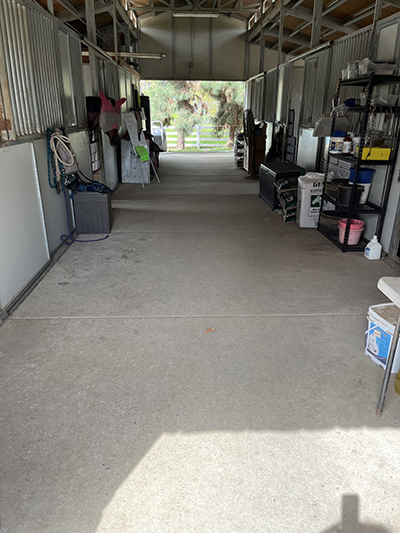
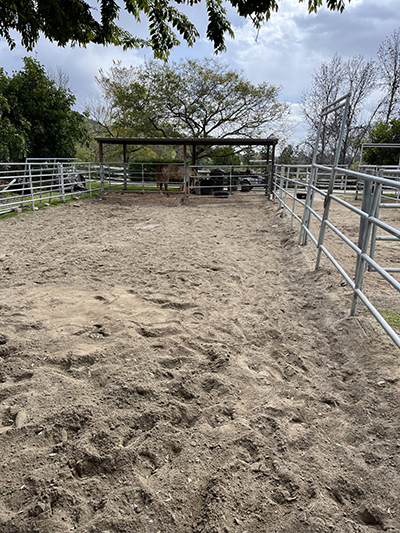
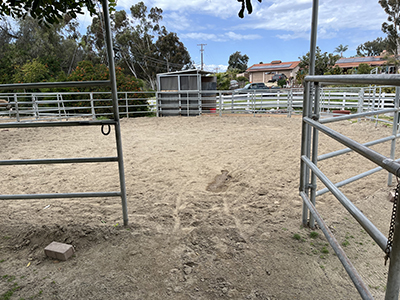
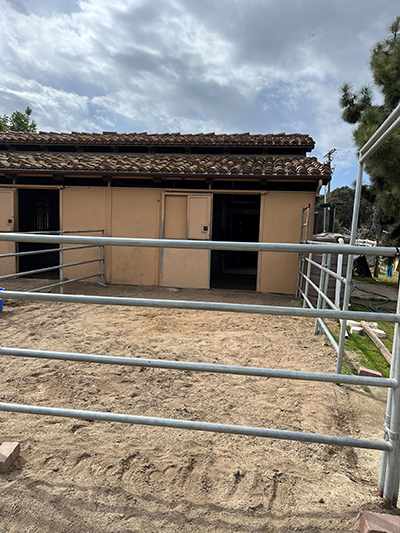
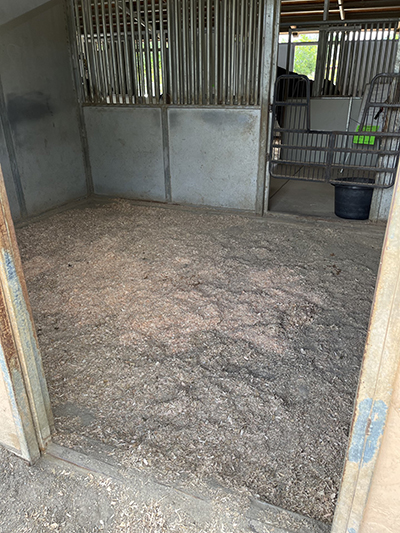
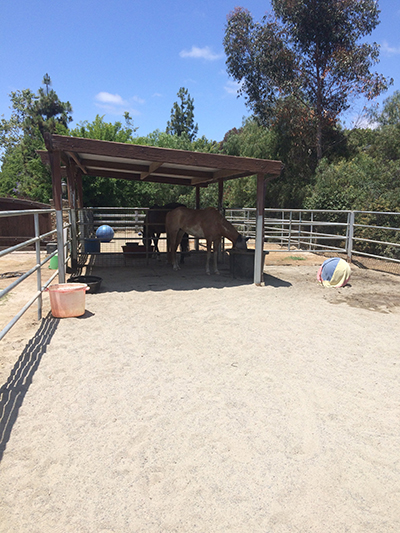
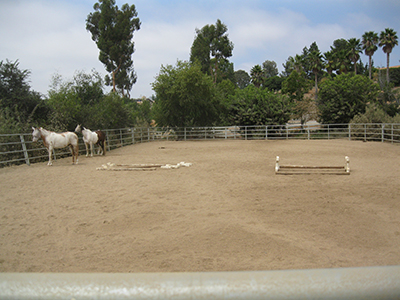
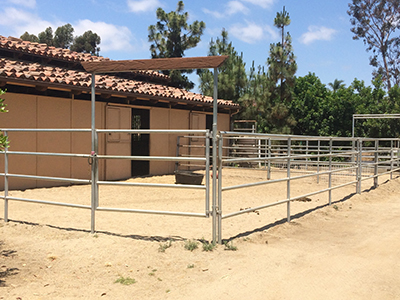
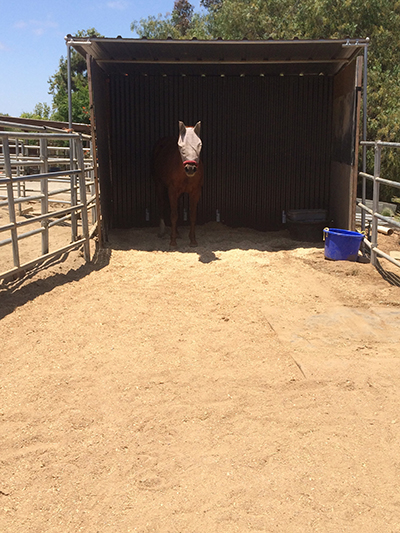
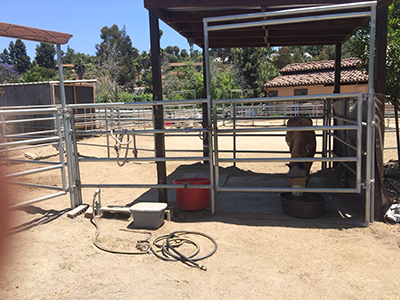
Are the organization's rules, restrictions and warnings (signage) conspicuously posted in easily accessible locations? Yes
Are the organization's emergency contacts, including veterinarian contact information, conspicuously posted in easily accessible locations? Yes
Are human and equine first aid kits easily accessible? Yes
Regarding all shelters where horses are housed including run-in sheds:
Do horses have assigned stalls in the barn/structure(s) or exclusively assigned shelter locations where they are separated from other horses with a barrier? Yes
How many hours per day, on average, are horses stalled or restricted to these sheltered exclusive shelter locations? 4-8
How often are the stalls/shelters cleaned, i.e., kept in good repair and free of standing water, accumulated waste, sharp objects and debris? 6-7 Days a Week
Do all stalls/shelters allow horses to lie down, stand up and turn around and provide protection from inclement weather (wind, sleet, rain, snow and extreme temperatures)? Yes
Are stalls/shelters kept in good repair, with adequate ceiling height, and free of standing water, accumulated waste, sharp objects and debris? Yes
Are floors constructed and maintained for both good drainage and traction? Yes
Is there a ventilation and circulation system in place to allow free flow of air to control temperature, and humidity, and to prevent air stagnation? Yes
Is wiring inaccessible to horses and maintained for safety in all areas of facility? Yes
Are fire prevention/protection measures (fire alarms, extinguishers and sprinkler systems) maintained and in good working order? Yes
Is there adequate lighting to ensure safety in all areas of facility? Yes
How many hours per day, on average, are horses turned out:
Equines are out 1 to 3 hours per day
Equines are out 9 to 15 hours per day
The following describes the pastures at this facility:
This facility does not have pastures where equines can graze on pasture grass
Not Checked:
This facility has a written plan in place for pasture management, which includes guidelines for seeding, fertilizing, irrigation, mowing, dragging, harrowing, manure removal, removal of debris, the control of poisonous plants, and a schedule for cleaning
A dedicated staff person(s) is responsible for pasture management
All pastures are fenced to prevent escape or injury
Barbed wire is used for fencing
Electric fencing is used; electric wires or tape fence are visibly marked
Fencing checks, such as broken or missing planks, loose fence posts, exposed or loose nails, detached wires, etc., are done regularly
Pastures are rotated
Pastures have natural protection for equines (i.e., trees)
Pastures have man-made protection for equines (i.e., shelters)
This facility has a written plan in place for pasture management, which includes guidelines for seeding, fertilizing, irrigation, mowing, dragging, harrowing, manure removal, removal of debris, the control of poisonous plants, and a schedule for cleaning
A dedicated staff person(s) is responsible for pasture management
All pastures are fenced to prevent escape or injury
Barbed wire is used for fencing
Electric fencing is used; electric wires or tape fence are visibly marked
Fencing checks, such as broken or missing planks, loose fence posts, exposed or loose nails, detached wires, etc., are done regularly
Pastures are rotated
Pastures have natural protection for equines (i.e., trees)
Pastures have man-made protection for equines (i.e., shelters)
The following describes the turnout areas other than pastures at this facility:
This facility has a written plan in place for the maintenance of turnout areas, which includes a schedule for cleaning, manure removal, and dragging
A dedicated staff person(s) is responsible for the maintenance of turnout areas
All turnout areas are fenced to prevent escape or injury
Fencing checks, such as broken or missing planks, loose fence posts, exposed or loose nails, detached wires, etc., are done regularly
Not Checked:
This facility does not have turnout areas
Barbed wire is used for fencing
Electric fencing is used; electric wires or tape fence are visibly marked
Turnout areas have man-made protection for equines (i.e., shelters)
This facility does not have turnout areas
Barbed wire is used for fencing
Electric fencing is used; electric wires or tape fence are visibly marked
Turnout areas have man-made protection for equines (i.e., shelters)
The following policies and procedures are in place at the facility to restrict public access and to keep horses safe:
The property owner, staff member or caretaker lives on the premises and ensures that public access is restricted and is responsible for the security of the facility and equines
There is a mechanism in place to monitor equines overnight
No Trespassing signs are posted
Hold Harmless signs are posted
Entrance gates are locked at night
Visitors are only permitted at specific times
The property is fitted with a security system that is monitored internally by staff (or the property owner)
The perimeter of the property is fully fenced
Not Checked:
A security guard is present at night
By Appointment Only signs are posted.
Authorized Personnel Only signs are posted
Visitors are only permitted in specific areas
The property is fitted with motion lights
The property is fitted with a security system monitored by police or a professional service
A security guard is present at night
By Appointment Only signs are posted.
Authorized Personnel Only signs are posted
Visitors are only permitted in specific areas
The property is fitted with motion lights
The property is fitted with a security system monitored by police or a professional service
Equine Care/Emergency Preparedness: Saving Horses, Inc. Ranch (*Main) 2026 and 2025 This section is required.
Horse Health Care/Barn Management Records: What system is used to collect and store health/horse care records?
Notebook or equivalent (technology not utilized)
The organization utilizes its own system to maintain records
The following items are consistent with our feed management plan and practices:
Equines are provided with individualized feeding plans, including supplements, according to the equine's age, breed/type, condition, size, work level and any health issues, consisting of nutritious food provided in sufficient quantity and access to adequate natural forage, or be fed daily, or as recommended by the organization's veterinarian
Feed plans are determined in consultation with a veterinarian
Supplement plans are determined in consultation with a veterinarian
Equines are fed grain in individual stalls
Staff and/or volunteers are trained in proper feed measurements and protocols and observed periodically to ensure they are feeding correctly
The feed chart is centrally located and updated as needed
The area(s) where hay, feed, grain, and supplements are stored are kept clean, free of debris and chemicals, and protected from weather and other animals in rodent-proof and mold-proof containers and grain bins
Feed, supplements and hay types are clearly labeled
Water sources, i.e., buckets, troughs, automatic waterers, etc. are kept clean, free of contaminants, debris and chemicals, protected from weather and other animals, and be positioned or affixed to minimize spillage.
Medications are kept in a secure area
Not Checked:
Equines are fed grain in groups
Equines are fed grain in groups
Is clean, potable water available at all times for all equines? Yes
Hoof Care: How often is hoof care provided for each equine? Every 4-8 weeks and when an issue arises
Dental Care: How often is dental care provided for each equine? Annually and when an issue arises
Horse checks: How often are equines visually and physically checked by personnel at the facility? Every day or 6 days a week
Our organization has the following parasite and fly/insect control protocols in place, including remedies used to control flies and insects:
Our organization follows the parasite control guidelines of our veterinarian, including fecal testing and de-worming
Fly/Insect Control Remedies:
Fly parasites
Feed Through Products
Fly Spray Repellent
Fly Masks
Fly Sheets
Fans
Not Checked:
The following represent the biosecurity practices in place at facility:
Our organization follows the biosecurity guidelines of our veterinarian
Sick, affected and/or quarantined equines do not have contact with other equines or other animals
The organization has a written biosecurity plan
Staff are trained in best practices related to biosecurity
Volunteers are trained in best practices related to biosecurity
A specific individual is trained and assigned to care for sick, affected and/or quarantined equines
Sick, affected and/or quarantined equines are cared for last if the caretaker must also care for healthy equines
Restricted access signs are posted at primary points of access to sick, affected and/or quarantined equines
Hand sanitizers are available at all primary points of access to sick, affected and/or quarantined equines
Footbaths are available at all primary points of access to sick, affected and/or quarantined equines
Manure and bedding from sick, affected and/or quarantined equines is removed from the facility - not put in open air piles, and not spread on pastures
Quarantine areas, such as stalls, aisle ways, paddocks, and common areas, are cleaned (and needed, disinfected) after conclusion of the quarantine.
Trailers/vans used by sick, affected and/or quarantined equines are cleaned and disinfected after each use and cleaning takes place away from where equines are sheltered
Equipment used by sick, affected and/or quarantined equines is not shared
Equipment used by sick, affected and/or quarantined equines is cleaned of organic debris and disinfected after each use
Latex gloves, or equivalent gloves, are worn when working with sick, affected and/or quarantined equines
Not Checked:
Equines are not quarantined on arrival.
Equines are not quarantined on arrival.
Additional information on biosecurity:
Out of state equines are quarantined out of state. They are issued a health cert prior to transport to CA. Horses rescued locally will be quarantined at the SHI Encinitas ranch if they are coming from a local auction or feedlot. They will not be quarantined if they are coming from another ranch or someone's home, as long as they have a health certificate. If illness is indicated, the horse will be quarantined at the SHI facility. Our veterinarian is always consulted.
The following represent the manure removal practices in place at facility:
Manure is stored in dumpster(s)
Manure is hauled, sold or given away
Our organization adheres to the manure management guidelines set by the state, local authorities, and/or our organization's veterinarian
Not Checked:
Manure is piled in an area where equines are not located
Manure piles are covered
Manure piles are composted or spread on pastures
Manure is piled in an area where equines are not located
Manure piles are covered
Manure piles are composted or spread on pastures
The following steps are taken to help staff and volunteers readily identify each horse on the property:
Equines are assigned the same exclusive stall/shelter location each day
Name plates are located on the stall/shelter location
Staff and volunteers are provided with an information packet with equine profiles, including photos and detailed descriptions
Staff/volunteers are provided training on conformation, markings, colors, and breeds
Team leaders work with new staff/volunteers until they are able to identify the equines
Not Checked:
Photos are located on the stall/shelter location
Equines wear halters with nametags
A notebook or binder with photos and information on each equine is easily accessible
A map/diagram is posted showing the location of each equine with equine names and photos
Equine photos and profiles are available on the website
Photos are located on the stall/shelter location
Equines wear halters with nametags
A notebook or binder with photos and information on each equine is easily accessible
A map/diagram is posted showing the location of each equine with equine names and photos
Equine photos and profiles are available on the website
Our organization has the following policies and procedures in place pertaining to tack, apparel and equipment:
All equines have specifically assigned apparel, equipment and tack (saddles/bridles if ridden) that is not shared
Blankets, sheets and turn out apparel are fitted and utilized for each equine appropriate to the equine's needs and the weather conditions
Blankets, sheets and turn out apparel are cleaned regularly as needed
Riding Tack is always cleaned after each use
Riding Tack is inspected for overall working condition before each use by trained personnel
Riding Tack is assessed for fit before each use by trained personnel
Riding Tack is assessed for fit by trained personnel when an equine's body condition changes
Riding Tack is assessed for fit by trained personnel when an equine's disposition changes
Assigned riding tack is clearly labeled
Riding Tack is stored in a climate-controlled location
Helmets are cleaned/disinfected after each use
Helmets are replaced after a fall
Helmets are replaced at least every five years.
Not Checked:
Saddles are shared
Saddle pads are shared
Bridles are shared
Bits are shared
Blankets are shared
Sheets are shared
Turnout apparel is shared
Halters are shared
Riding Tack is always cleaned at least weekly
Riding Tack is cleaned only when needed
This facility enlists the services of a professional saddle fitter at least once a year
Helmets are shared
No equines are ridden; saddles, bridles, etc. not applicable.
Saddles are shared
Saddle pads are shared
Bridles are shared
Bits are shared
Blankets are shared
Sheets are shared
Turnout apparel is shared
Halters are shared
Riding Tack is always cleaned at least weekly
Riding Tack is cleaned only when needed
This facility enlists the services of a professional saddle fitter at least once a year
Helmets are shared
No equines are ridden; saddles, bridles, etc. not applicable.
Emergency Preparedness: Saving Horses, Inc. Ranch: *Main This section is required.
The following plans, policies, and procedures are in place at the facility to handle emergencies and address weather related issues, fire safety procedures, and/or any additional hazardous scenarios the facility could potentially experience:
Emergency procedures are posted prominently
The facility owns or has access to a generator
The facility maintains at least two weeks of hay, feed, shavings and medications
The facility maintains appropriate liability and/or workers' compensation insurance
The organization has a written emergency preparedness/safety plan (EPP)
Not Checked:
The facility collects and maintains medical information from staff, volunteers, and clients
The written EPP addresses the following areas: The facility collects and maintains medical information from staff, volunteers, and clients
Local fire department and/or the state's emergency planning department procedures
Medical emergencies for clients, staff, and volunteers
Medical emergencies for equines
Evacuation plans
Power outages
Fire
Natural Disasters - thunderstorm, hurricanes, earthquakes, tornados, etc
Protocols to notify emergency personnel
Building/facility exit plans
Not Checked:
Terrorist attacks
Terrorist attacks
The facility follows the specific procedures to help PREVENT emergency situations:
Smoking is strictly prohibited
NO SMOKING signs are posted prominently
Hay is stored away from permanent or temporary structures where equines are stalled
Permanent or temporary structures where equines are stalled are kept free of dust, cobwebs, trash, cleaning rags, and other flammable items
Aisles and doorways are kept clear
Not Checked:
Heaters with automatic shutoff settings are used
Heaters with automatic shutoff settings are used
How often are the following checked or performed?
Fire Extinguishers are checked: Annually
Smoke detectors are checked: Semi-annually
Fence lines are checked: Weekly
Turnout Areas are checked: Weekly
Sprinkler systems are checked: Quarterly
Fire drills are conducted: Monthly
Review of safety protocols with staff are conducted: Monthly
Review of safety protocols with volunteers are conducted: Monthly
The Emergency Preparedness Plan is reviewed and updated: Quarterly
Equine Transportation: 2= Onsite: 1 (1 + 0) + Offsite: 1
3-horse van/trailer with truck:
1 Owned onsite
6-horse van/trailer with truck:
1 Access offsite;
DISCLAIMER: The listing of this organization on this site is not an endorsement. EQUUS Foundation Guardians receive a star rating of 4 being the highest to 1 being the lowest based on the degree to which the organization meets the EQUUS Foundation standards for equine welfare and business practices.
If you have concerns about this organization, please contact us here.
© Copyright 2018 EQUUS Foundation 367 3.50
© Copyright 2018 EQUUS Foundation 367 3.50